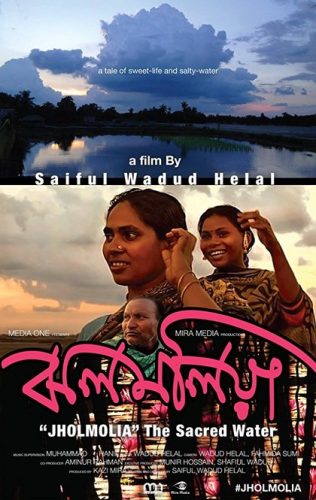
“JHOLMOLIA” The Sacred Water – a documentary by Saiful Wadud Helal, who is originally from Bangladesh and has worked as director, producer and writer for television channels in Canada and abroad.
Saiful Wadud Helal’s latest film echoes the need for rebuilding our relationship with nature and water, and questions how modernization has had a direct impact on water crises in Bangladesh.
Following the devastating cyclone in 2005, multiple villages were destroyed. Jholmolia, a small pond in an isolated region of Southern Bangladesh, was the only surviving area left untouched by the destruction. This pond now sits surrounded by villages.
Jholmolia is not only a source of drinking water, but also a place where villagers spend much of their time socializing and interacting with one another. They come to discuss socio-political and spiritual issues that affect them in their daily lives. This kind of interaction creates a sense of community and belonging for the villagers. Jholmolia has thus become the centre of many people’s well-being and an intrinsic part of their identity. This body of water serves as a lifeline for the neighbouring villages, and people have developed a sacred bond with the pond.
Muslim and Hindu villagers alike worship Jholmolia as their mother and believe her waters bring light into their lives. A sense of unity within people’s hearts and minds grows through this special relationship, and it helps to remove some of the ever-present political polarization and religious extremism in Bangladesh. Through Jholmolia, the villagers discover that the essence of humanity lies in love, where nature and water form an integral part of the living cycle.
As a result of damaging cyclones and floods, increased drinking water crises and infiltration of salt water into freshwater sources in Bangladesh, hundreds of people have become homeless. In the midst of these challenges, the untouched sacred body of water affectionately known as “Ma Jholmolia” gives hope to the people of Hurka village.
The filmmaker takes us on a journey to discover the spirit of Jholmolia through the various lives of the villagers. He portrays how the grace of this small sacred lake has enhanced everyone’s well-being. Through their life stories, viewers are left with a deep sense of longing to return home. Saiful Wadud Helal himself searches for this sense of home in his native country, and finally finds it in the spirit of Jholmolia.
The film shows us that water has deeper dimensions stretching beyond our everyday perceptions. JHOLMOLIA reminds us about the consequences of modernization and how government control over basic needs like drinking water can have a devastating impact on people’s health and social development. Most importantly, it can undermine their knowledge of how to live in harmony with Mother Nature. The villagers see Jholmolia as their only hope of survival, and they believe that this living body of water protects them from all calamities and embraces them with endless generosity. At a time when we are going through drinking water crises around the world, JHOLMOLIA offers us a glimpse of hope.
This film asks a broader question as well: in this industrialized world, are we willing to sacrifice essential clean water for monetary gain? JHOLMOLIA shows how our actions today are directly affecting villages like Hurka and their chance of survival.
At the end of the film, Jholmolia becomes a home to many, including the filmmaker.
This is a beautiful film with a strong spiritual and political message conveyed through the sentiments and stories of the villagers, and delivered through the spirit of “Ma Jholmolia.”










